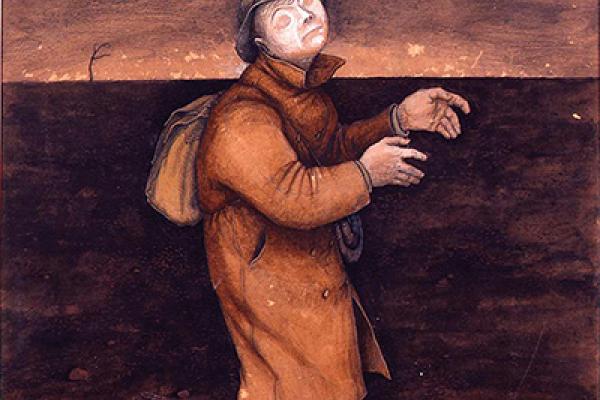CANADIAN ARTIST William Kurelek was influenced both by his experiences with mental illness and his conversion to Catholicism. He would eventually be considered psychiatrically recovered, but he was institutionalized as a young man in the mid-’50s, during which he created one of his best known early paintings, showing a blind man wandering in a desert, captioned “Where am I? Who am I? Why am I?”
These are foundational questions for all of us, not just a gifted artist in a time of suffering. The institutional church tends to assert that the answers to such questions are, if not simple, at least imminently knowable: Just pull up a pew and stay awhile. Many of us who are already believers come to assume that our job is to have a spiritual GPS always on, ready to point others in the “right” direction.
But of course, finding God or our place in the universe has rarely been that easy. Church may or may not be the place where we who are lost are found. The person we’ve always claimed to be may be shattered by unexpected events or discoveries. Or theologies that we once took for granted may come to ring hollow. As Diana Butler Bass writes in her new book, Grounded: Finding God in the World, “millions of people are navigating the space between the secular world and conventional theism. They are making a path between the two that nevertheless embraces both, finding a God who is a ‘gracious mystery, ever greater, ever nearer’ through a new awareness of the earth and in the lives of their neighbors.”
Several other very distinct books released this year wrestle with the shape of faith, finding or naming God, and how secrets revealed can shift our self-understanding and shake even our deepest beliefs.
In her best-selling 2013 spiritual memoir, Pastrix: The Cranky, Beautiful Faith of a Sinner & Saint, Nadia Bolz-Weber described her journey from fundamentalist childhood to alcoholic rebel to believer with a priestly call. A tattooed, weight-lifting former standup comedian who is now a Lutheran (ELCA) pastor, Bolz-Weber helped found House for All Sinners and Saints in Denver, which combines ancient liturgy and theological orthodoxy with artistic expression, social justice, and radical inclusion.
Read the Full Article

